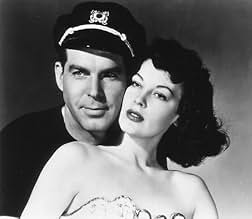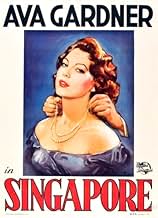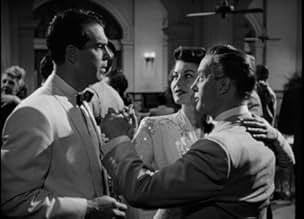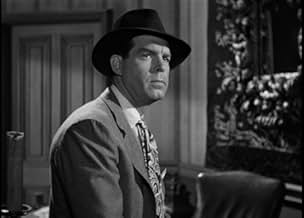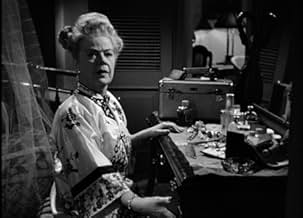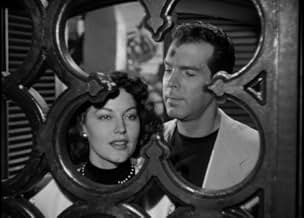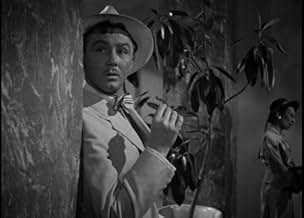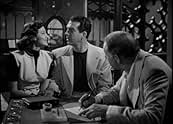अपनी भाषा में प्लॉट जोड़ेंAfter WW2, an American skipper returns to Singapore to retrieve his hidden stash of pearls and finds his lost fiancée who now has amnesia.After WW2, an American skipper returns to Singapore to retrieve his hidden stash of pearls and finds his lost fiancée who now has amnesia.After WW2, an American skipper returns to Singapore to retrieve his hidden stash of pearls and finds his lost fiancée who now has amnesia.
Richard Abbott
- Maitre d'
- (बिना क्रेडिट के)
Patrick Aherne
- British Officer
- (बिना क्रेडिट के)
Philip Ahn
- Jimmy - Bartender
- (बिना क्रेडिट के)
Norman Ainsley
- Immigration Official
- (बिना क्रेडिट के)
फ़ीचर्ड समीक्षाएं
Fred Macmurray played one unforgettable role as Walter Neff in "Double Indemnity" (1944) and I cannot quite separate him from this role when I see FM perform in other films like "Singapore" where he plays Matt Gordon a pearl smuggler.I fervently believe the best acted performances come from the actor having an affinity or some actual practical experience of the role in real life.I am not saying FM was into insurance fraud but he looked more comfortable in an American setting.The plot has been adequately commented on by other reviewers above, most notably by Terrell-4 from San Antonio Texas, whose review I commend.
There were a few things I found irritating and getting a second rate TV director will not produce a first class film.First, after Ava Gardner had being roughed up by one of the "baddies" to get her to talk, there was not a blemish, bruise or mark on her Venus like face.When FM wants to pay for his bar bills he decides how much he will pay leaving some notes on the table, without waiting to receive a bill - I noticed he did this on at least two occasions.Yet again actors (FM) appear to be able to walk through other guests hotel bedroom doors or magically have the right key in their pockets, this is a general continuity criticism of films of this era; so much for hotel security.What is an American gangster doing in Singapore? One of the "heavies" sounded like he came from 1920s Chicage!
On the plus side I liked Roland Culver's performance as plantation manager van Leiden who played an honest man who is prepared to give up his Venus like wife because he knows she really loves Walter Neff (sorry FM).Richard Haydn for once plays it straight as the police commissioner in colonial Singapore on the trail of local malefactors and I hardly recognised him compared to say his performance as Mr Wilson in "Cluny Brown" (1946).
Taken all together I found it enjoyable but uneven and therefore rated it 6/10.
There were a few things I found irritating and getting a second rate TV director will not produce a first class film.First, after Ava Gardner had being roughed up by one of the "baddies" to get her to talk, there was not a blemish, bruise or mark on her Venus like face.When FM wants to pay for his bar bills he decides how much he will pay leaving some notes on the table, without waiting to receive a bill - I noticed he did this on at least two occasions.Yet again actors (FM) appear to be able to walk through other guests hotel bedroom doors or magically have the right key in their pockets, this is a general continuity criticism of films of this era; so much for hotel security.What is an American gangster doing in Singapore? One of the "heavies" sounded like he came from 1920s Chicage!
On the plus side I liked Roland Culver's performance as plantation manager van Leiden who played an honest man who is prepared to give up his Venus like wife because he knows she really loves Walter Neff (sorry FM).Richard Haydn for once plays it straight as the police commissioner in colonial Singapore on the trail of local malefactors and I hardly recognised him compared to say his performance as Mr Wilson in "Cluny Brown" (1946).
Taken all together I found it enjoyable but uneven and therefore rated it 6/10.
Before it became the modern miracle of cheerless, nose-to-the-grindstone capitalism, Singapore had a past; in the opening years of the Cold War, it was known as Red City. John Brahm's romantic intrigue, set just before and after World War II, evokes that shady period, using the city-state at the tip of the Maylay peninsula as another Oriental port of intrigue, like Shanghai or Macao.
Fred MacMurray had been a smuggler as the war drew close; when the Japanese attacked, he lost both a fortune in pearls and his fiancee, Ava Gardner, who was presumed killed. Now it's 1946 and, returning to retrieve the pearls he'd hidden, catches sight of Gardner, now married but with no memory of her past -- or theirs. In his quest to restore both pieces of his pre-war bliss, he must overcome multiple obstacles: a shrewed British colonial official; Gardner's possessive, rich husband; and a criminal gang headed by Thomas Gomez, who's also after those pearls.
Though there's a lot packed into it, Singapore's plot stays pretty thin, but Brahm makes the most of what he has to work with. A craftsmanlike if uneven director, he contributed several installments to the noir cycle (Hangover Square, The Locket, the Brasher Doubloon). His work rarely rose to the heights of inspiration reached by fellow European emigres like Fritz Lang, Robert Siodmak or Billy Wilder, and Singapore was his swan song to Hollywood (he ended up in television).
At first glance, it might seem a recipe for folly to team MacMurray with the sultry Gardner. But he had survived being matched against Barbara Stanwyck (and more than once), while her fiery reputation owed more to her off-screen life than to her film roles. So no sparks fly, but the story gets told. Singapore remains a stylish -- Brahm sets those ceiling fans spinning -- if lightweight romantic thriller (all told, it's two or three cuts above John Farrow's somewhat similar Calcutta of the same year).
Fred MacMurray had been a smuggler as the war drew close; when the Japanese attacked, he lost both a fortune in pearls and his fiancee, Ava Gardner, who was presumed killed. Now it's 1946 and, returning to retrieve the pearls he'd hidden, catches sight of Gardner, now married but with no memory of her past -- or theirs. In his quest to restore both pieces of his pre-war bliss, he must overcome multiple obstacles: a shrewed British colonial official; Gardner's possessive, rich husband; and a criminal gang headed by Thomas Gomez, who's also after those pearls.
Though there's a lot packed into it, Singapore's plot stays pretty thin, but Brahm makes the most of what he has to work with. A craftsmanlike if uneven director, he contributed several installments to the noir cycle (Hangover Square, The Locket, the Brasher Doubloon). His work rarely rose to the heights of inspiration reached by fellow European emigres like Fritz Lang, Robert Siodmak or Billy Wilder, and Singapore was his swan song to Hollywood (he ended up in television).
At first glance, it might seem a recipe for folly to team MacMurray with the sultry Gardner. But he had survived being matched against Barbara Stanwyck (and more than once), while her fiery reputation owed more to her off-screen life than to her film roles. So no sparks fly, but the story gets told. Singapore remains a stylish -- Brahm sets those ceiling fans spinning -- if lightweight romantic thriller (all told, it's two or three cuts above John Farrow's somewhat similar Calcutta of the same year).
This film begins with a man by the name of "Matt Gordon" (Fred MacMurray) returning to the city of Singapore not long after the end of World War 2. The main reason for his return is due to the fact that he had hidden a large cache of illegal pearls and he has come to take ownership of them again. Along with that, there was a young woman named "Linda Grahame" (Ava Gardner) who he had to leave behind when the Japanese attacked the city and--even though he believes she was killed during the war--he feels the need to find out. One way or the other. Be that as it may, no sooner does he arrive in Singapore then he is met by a high-ranking member of law enforcement named "Deputy Commissioner Hewitt" (Richard Haydn) who has a professional interest in recovering the illegal pearls. Likewise, a criminal figure by the name of "Mr. Maribus" (Thomas Gomez) who is equally interested in possessing these pearls as well. Yet as much as Matt wants these pearls, his priorities change when he meets Linda again. The problem is, she professes to have never met him. Now, rather than reveal any more, I will just say that this was an interesting movie, more or less, with certain similarities to "Casablanca" being somewhat obvious. To that effect, although both Fred MacMurray and Ava Gardner put in decent performances, I didn't really see much chemistry between them. At least, nothing like Humphrey Bogart and Ingrid Bergman had in the previously mentioned film. Even so, I enjoyed this movie for the most part and I have rated it accordingly. Slightly above average.
This is a fairly decent yarn about a fortune hunting American in the days when Americans weren't considered ugly.
It has the elements of film noir and mystery, though not really a lot of mystery. It is the story of a man returning to Singapore from America to find illegal valuables he hid.
Many of the characters are a bit cliché, but it is an entertaining film, so it rates fairly high. The main nitpick that brings it down to a 6 is the ending, which is dragged out for a Hollywood cliché. The movie should have ended about nine minutes before it did. The way it ended was not only unrealistic and Hollywood, but just completely anticlimactic.
It has the elements of film noir and mystery, though not really a lot of mystery. It is the story of a man returning to Singapore from America to find illegal valuables he hid.
Many of the characters are a bit cliché, but it is an entertaining film, so it rates fairly high. The main nitpick that brings it down to a 6 is the ending, which is dragged out for a Hollywood cliché. The movie should have ended about nine minutes before it did. The way it ended was not only unrealistic and Hollywood, but just completely anticlimactic.
Director John Brahm manages to hold this poor-man's "Casablanca" together. The picture moves at a good clip and Brahm makes the studio-set Singapore visually interesting. There's help too from stars Fred MacMurray and Ava Gardner as lovers whose lives are complicated by World War II and Gardner's amnesia when MacMurray, who thought her dead, finds her again in postwar Singapore, married to a wealthy planter. MacMurray and Gardner are really a goofy romantic team, but MacMurray has his appealing casual charm, and Gardner's vague, unfocused acting works well in some of her amnesiac scenes (plus she was at her most beautiful in the late 1940's). Supporting turns by pros like Richard Haydn and Spring Byington are also a plus. Overall, contrived and derivative, but it looks like a classic compared to the depressing Errol Flynn 1957 remake, "Istanbul."
क्या आपको पता है
- ट्रिविया"Lux Radio Theater" broadcast a 60 minute radio adaptation of the movie on November 3, 1947 with Fred MacMurray and Ava Gardner reprising their film roles
- भाव
Linda: So let me ruin you fast.
Matt Gordon: How many have you ruined?
Linda: You're my last victim, darling.
- कनेक्शनReferenced in Columbo: How to Dial a Murder (1978)
- साउंडट्रैकTemptation
(1933)
Music by Nacio Herb Brown (uncredited)
Used throughout the movie as a leitmotif for Linda Grahame
टॉप पसंद
रेटिंग देने के लिए साइन-इन करें और वैयक्तिकृत सुझावों के लिए वॉचलिस्ट करें
- How long is Singapore?Alexa द्वारा संचालित
विवरण
- चलने की अवधि1 घंटा 19 मिनट
- रंग
- पक्ष अनुपात
- 1.37 : 1
इस पेज में योगदान दें
किसी बदलाव का सुझाव दें या अनुपलब्ध कॉन्टेंट जोड़ें



